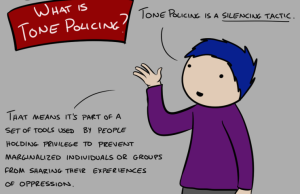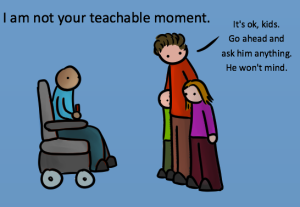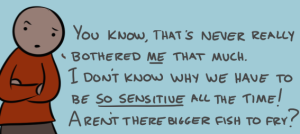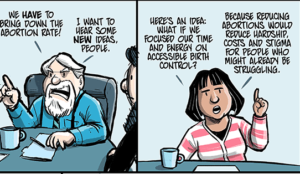
Source: BET
Originally published on Role/Reboot and cross-posted here with their permission.
Hello, fellow men.
By now, I’m sure you’ve seen the viral Hollaback! video of the woman who got cat-called an absurd amount of times within the course of a day. You might have even seen the CNN segment of Amanda Seales and Steve Santagati debating how street harassment should be regarded by women.
I’d like to be able to say that this dude, Steve Santagati, who was defending street harassment, is but a dingleberry hanging off the ass of obscurity, but I can’t. If the pushback from men against the Hollaback! video was any indication, he obviously has lots of company with other men who think that cat-calling is harmless — or even positive.
And while he may be an extreme example of men who do this, that doesn’t mean that the rest of us who are less awful are automatically absolved of needing to do better. Just because you’re not Santagati-ing a woman doesn’t mean you’re not somewhere on the harassment spectrum.
So it’s confusing, right? Mixed signals and all that? I get what you’re saying. You feel like it’s unfair of a woman to assume that your intention is malicious whenever you tell her that she’s beautiful.
You weren’t trying to offend her.
Harassment? No, that’s not what you meant at all.
Can’t women just take a compliment?
Actually, women can take compliments. I mean, really, who doesn’t like having a little bit of wind put in their sails?
However, women likely don’t want commentary about them from complete strangers like you and me. That’s when comments go from compliments to harassment.
To help you navigate this social odyssey of interacting with women, let’s take a little quiz together.
Question #1: Do you know this woman?
Question #2: Does this woman know you?
Question #3: If you know each other, has this woman directly asked you for an opinion about what she looks like or what she’s doing?
If you answered “no” to any of the above questions, then sharing your unsolicited opinion with a woman is not a compliment.
This is harassment (not good), which is an oily cog in the terrible machine known as objectification (super not good).
This is not a feeling anybody enjoys being forced upon them. Take, for instance, that woman you saw jogging in your neighborhood last week. You remember, the one that you howled at while you and your pal were driving past her?
All she was doing was attempting to do something healthy and just happened to be doing it in public. You, however, with your unwanted cat-calling, managed to reduce her to a thing that is merely to be fucked.
Given that you’re directly dehumanizing her by treating her this way, do you really think your comments and whistling are flattering or encouraging? Can you still really not understand why women don’t enjoy and welcome your cat-calls?
Oh, I see. That’s not how you mean it. And besides, you respect women and can’t figure out why they’re so defensive when you try to talk them up at a bar.
You’re one of the nice guys. You’re not trying to objectify her. I get it.
Here’s the thing about that, though: Objectification aside, you’re not the first unknown man who’s attempted to talk to her.
And while you may genuinely think that there’s nothing wrong with affirming her attractiveness when trying to start a conversation with her, she has encountered other men before who tried a similar approach and it took a nasty turn. In fact, when she said “no thanks” to that guy’s advances, he got nasty, snarled the word “bitch” at her, and became a real threat to her safety.
That’s not an interaction anybody just shrugs off. Seriously, after living through a traumatizing event, aren’t you usually pretty cautious about putting yourself in the same situation that led to that terrible outcome?
If somebody broke into your home one night while you were sleeping, would you be able to go back to sleep immediately after your altercation with the intruder was over? No, you wouldn’t. You probably wouldn’t sleep soundly for many nights.
Now instead of that break-in happening only once in your life, imagine that someone broke into your house several times a month. Imagine it’s always someone different and they’re always breaking in at different times of the night and always via different methods.
Would you ever feel comfortable living with the expectation that anyone anywhere could be the next person who’s going to violate the safety of your home? How long do you think it would be before you stopped being suspicious of every single stranger who walked by your house, wondering if they were discreetly trying to scope out your house for when they break in later?
That’s why many women wish we’d never talk to them. Their safety in public spaces has been so routinely intruded upon by other men that they can no longer trust that a simple compliment from a man is not going to end in violence.
Just because you may have innocent intentions in acting a certain way doesn’t mean that it is exempt from following a pattern of behavior that is historically threatening, demeaning, condescending, and otherwise just sincerely terrible.
Yes, I know, you’ve never meant to scare women like that. I sympathize, but your private intentions don’t really matter here.
I’m sorry, but it’s impossible for you to be exempt from all the other men who harassed and threatened women simply because you decided that history shouldn’t apply to you. That’s just not how it works, guys.
I can see why you might think this is unfair, but it’s a lot less unfair than women having to live in a world where every single time they leave the house, they’re accepting a high level of risk for harassment and other violence.
Whether you like it or not, know that every time you whistle at a woman who you think is hot, every time you persist in trying to chat up a woman after she has already indicated she’s not interested, every time you tell a woman to smile for you, you are single-handedly reinforcing the social structures that make her not want to talk to you at all.
So how are we supposed to talk to women? Well, maybe it’s time for you to think about this whole thing differently. For starters, “Hey baby” and the like isn’t talking to women. That’s harassment.
And despite what tool bags like Santagati want to believe, women aren’t secretly hoping to get cat-called.
Plus, it’s really not endearing when you presume that you know how women’s minds work better than the women themselves.
If she decides she doesn’t want to talk to you, don’t double-down and pursue her even more aggressively. Seriously. That’s not cute. That’s terrorism. There is no such thing as “playing hard to get.”
And even if you’re the most sincere, non-threatening, teddy-bear-disguised-as-a-man guy ever, that’s still not a justification for the belief that women should talk to you just because you want them to.
Just go away, go on with your day, and leave her alone.
[do_widget id=”text-101″]
Drew Bowling is a soon-to-be social worker who writes about gender, race, and other intersecting issues. His writing has appeared on Role Reboot, Everyday Feminism, the Good Men Project, as well as at his oft-neglected but much-adored blog, Reading Without Men. Twitter is also a thing he does.
Search our 3000+ articles!
Read our articles about:
Our online racial justice training
Used by hundreds of universities, non-profits, and businesses.
Click to learn more




















